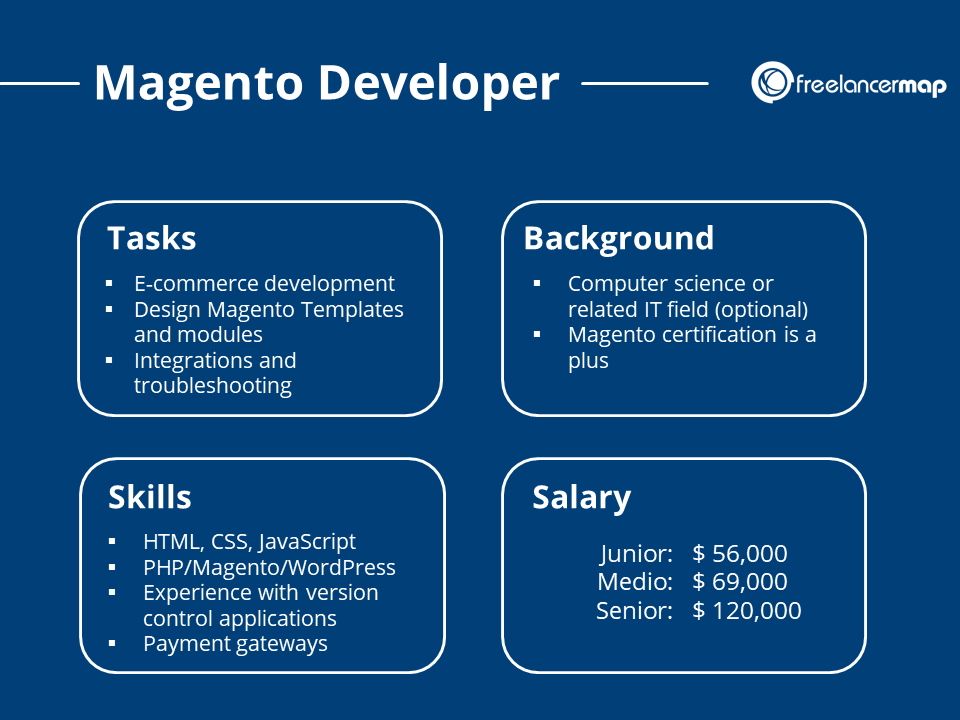Freelance Magento development is an exciting career choice for those who are passionate about e-commerce and web development. Magento is a powerful platform used by businesses worldwide to build and manage online stores. As a freelance Magento developer, you’ll have the freedom to work with clients from various industries, helping them build custom e-commerce solutions. The flexibility of freelancing also allows you to choose projects that interest you, giving you the opportunity to expand your skills while working from anywhere.
Understanding the Role of a Magento Developer

As a Magento developer, you’ll be responsible for creating, customizing, and maintaining e-commerce websites built on the Magento platform. Your main goal will be to ensure that your client's online store functions smoothly and meets the needs of their business. This includes tasks such as:
- Developing custom themes and templates for the store's design.
- Creating extensions and modules to add functionality.
- Optimizing the website for speed, performance, and security.
- Integrating third-party services, such as payment gateways or CRM systems.
- Providing ongoing maintenance and updates to the website.
Magento developers must work closely with clients to understand their business goals and provide technical solutions that align with those objectives. As a freelancer, you’ll also need to manage client communication, deadlines, and project scope independently.
Also Read This: How to Activate a Paused Gig on Fiverr
Essential Skills Needed for Freelance Magento Developers

To succeed as a freelance Magento developer, it’s important to have a strong technical foundation along with a good understanding of e-commerce practices. Here are some essential skills you’ll need:
- Magento Expertise: A deep understanding of Magento’s features, architecture, and customization options is essential.
- PHP and MySQL Knowledge: Magento is built on PHP and MySQL, so proficiency in these programming languages is a must.
- HTML, CSS, and JavaScript: Strong front-end development skills are important for creating custom themes and improving the user experience.
- Problem-Solving Abilities: You’ll need to troubleshoot issues and find solutions to complex challenges that arise during development.
- Version Control: Knowledge of tools like Git is important for managing code changes and collaborating with clients.
- SEO and Performance Optimization: A solid understanding of SEO best practices and website optimization is crucial for helping clients attract customers and improve site performance.
In addition to these technical skills, good communication, time management, and business development abilities will help you manage your freelance career effectively.
Also Read This: Element Navigation: How to Move Elements in Canva with Ease
Steps to Launch Your Freelance Magento Development Career

Starting your freelance Magento development career requires a combination of technical skills, business acumen, and marketing strategies. Here are the key steps to get started:
- Learn the Basics: If you're new to Magento, begin by mastering the platform's basics. Invest time in learning Magento's structure, tools, and features, including customizations and extensions.
- Gain Hands-On Experience: Practice your skills by working on personal projects or contributing to open-source projects. This helps build your confidence and gives you real-world experience.
- Obtain Magento Certification: While not mandatory, getting a Magento certification can boost your credibility and show potential clients that you're a qualified expert.
- Set Up a Professional Website: As a freelancer, you need a professional website that showcases your services, portfolio, and contact information. A well-designed site helps build trust with potential clients.
- Define Your Niche: Focus on a specific area of Magento development—such as theme customization, extension development, or performance optimization. Specializing in one niche helps you stand out from the competition.
- Start Small and Build Reputation: In the beginning, consider offering discounted rates or taking on smaller projects. This can help you gain positive reviews and referrals that will attract larger clients.
By following these steps, you'll be well on your way to establishing yourself as a successful freelance Magento developer.
Also Read This: SpyFu 30-Day Trial: Exploring its Features
Building a Strong Portfolio as a Magento Developer
A strong portfolio is essential for attracting potential clients and demonstrating your skills as a Magento developer. Here's how you can build an impressive portfolio:
- Showcase a Variety of Projects: Include a mix of projects that highlight different aspects of Magento development. This can include custom themes, extensions, and integrations that show your versatility.
- Include Client Testimonials: Positive feedback from previous clients helps build trust. Always ask your clients for testimonials after successfully completing a project.
- Detail the Challenges You Solved: For each project, explain the challenges you faced and how you overcame them. This demonstrates your problem-solving abilities and showcases your expertise.
- Use Before-and-After Comparisons: Showing before-and-after images of the websites or features you've worked on can help potential clients visualize the impact of your work.
- Keep it Updated: Regularly update your portfolio with new projects, keeping it fresh and relevant. As you gain more experience, your portfolio will evolve to reflect your growing skills.
Remember, your portfolio is your online resume. The more impressive and diverse your portfolio, the better your chances of attracting high-paying clients.
Also Read This: Mastering Creativity: Unveiling the Best Creative Gigs on Fiverr
How to Find Clients for Your Magento Development Services
Finding clients is a crucial part of freelancing. Here are several effective ways to attract clients for your Magento development services:
- Leverage Online Freelance Platforms: Websites like Fiverr, Upwork, and Freelancer are great places to find clients looking for Magento developers. Create an eye-catching profile with a clear description of your services.
- Network with Industry Professionals: Attend e-commerce and Magento-related conferences or online events. Networking with other developers and business owners can lead to client referrals.
- Use Social Media: Share your work, expertise, and valuable content on platforms like LinkedIn, Twitter, and Facebook. Engage with businesses and e-commerce groups to build your network.
- Offer Free Resources or Workshops: Hosting webinars or writing blog posts about Magento can help you showcase your expertise and attract clients interested in your services.
- Cold Emailing and Outreach: Reach out directly to businesses with Magento websites that may need help with improvements or new projects. Craft personalized emails explaining how you can assist them.
- Ask for Referrals: After completing successful projects, ask satisfied clients to refer you to others. Word-of-mouth referrals are one of the most powerful ways to find new clients.
By combining these strategies and consistently putting yourself out there, you'll be able to build a steady stream of clients for your freelance Magento development business.
Also Read This: Pricing for Freelance Copywriting Projects
Setting Your Rates as a Freelance Magento Developer
Setting the right rates as a freelance Magento developer is essential to ensure you are paid fairly for your skills and expertise. Your rates should reflect your experience, the complexity of the project, and the market demand. Here are some key factors to consider when determining your rates:
- Experience: Beginners should start with competitive yet affordable rates to attract clients and build a reputation. As you gain more experience and skills, you can gradually increase your rates.
- Project Complexity: More complex projects, such as custom Magento themes or integrations, should be priced higher than simple updates or maintenance tasks.
- Client Type: Large businesses typically have bigger budgets and may be willing to pay more for premium services, while small businesses may have tighter budgets.
- Hourly vs. Fixed Rates: Freelance Magento developers can either charge hourly or offer fixed rates per project. Hourly rates are suitable for ongoing work, while fixed rates work well for well-defined projects with clear deliverables.
- Market Research: Research what other Magento developers with similar experience are charging. This will help you remain competitive while ensuring you don’t undervalue your services.
Here’s a rough idea of average hourly rates for Magento developers:
| Experience Level | Hourly Rate |
|---|---|
| Beginner | $25 - $40 |
| Intermediate | $40 - $70 |
| Expert | $70 - $150+ |
Ultimately, setting your rates depends on your expertise, the type of projects, and the client’s budget. Be confident in the value you offer and adjust your rates as you grow in your freelance career.
Also Read This: Can I Reactivate My Fiverr Account?
Common Challenges and How to Overcome Them
As a freelance Magento developer, you may face several challenges. Here are some common issues and how to tackle them:
- Inconsistent Workload: Freelancers often experience fluctuations in workload. To overcome this, diversify your client base, seek recurring contracts, and set aside time for business development to ensure a steady flow of projects.
- Client Communication: Poor communication can lead to misunderstandings and delays. Set clear expectations with clients regarding timelines, deliverables, and feedback processes. Using tools like Trello or Slack can help streamline communication.
- Late Payments: Delayed payments can be frustrating. Protect yourself by setting up payment terms before starting the project, asking for a deposit, and offering multiple payment methods. You can also implement late payment fees to encourage timely payments.
- Managing Multiple Projects: Juggling multiple projects can be overwhelming. Use project management tools to stay organized, set realistic deadlines, and prioritize tasks based on urgency and importance.
- Staying Updated with Magento: Magento frequently releases updates and new features. Stay updated by following Magento’s official channels, attending webinars, or taking online courses to ensure your skills remain relevant.
Freelance work comes with its challenges, but with the right strategies and tools in place, you can navigate them effectively and build a successful career as a Magento developer.
Also Read This: Why Does Fiverr Take Tips?
FAQ
1. Do I need a degree to become a freelance Magento developer?
No, you don’t need a formal degree to become a freelance Magento developer. However, a strong understanding of web development, PHP, and Magento is essential. Self-study, online courses, and hands-on practice can help you build the necessary skills.
2. How do I get started as a freelance Magento developer?
Start by gaining experience with Magento, either through personal projects or freelance platforms. Build a portfolio, set competitive rates, and network to find clients. You can also offer smaller, affordable projects to build your reputation.
3. How much can I earn as a freelance Magento developer?
Your earnings will depend on your experience, project complexity, and the clients you work with. Beginner developers typically charge $25 - $40 per hour, while experienced developers can charge $70 or more. Over time, your earnings can increase as you gain expertise and build a client base.
4. How do I manage my freelance business?
Managing your freelance business involves handling client communication, setting rates, managing projects, and keeping track of your finances. Use tools like invoicing software, project management apps, and time trackers to stay organized and professional.
5. Is it necessary to be certified in Magento?
Certification is not required, but it can enhance your credibility. A Magento certification demonstrates your expertise and may make you more attractive to potential clients looking for qualified developers.
Conclusion
Launching a career as a freelance Magento developer can be highly rewarding, offering flexibility and the opportunity to work on exciting projects. To succeed, it’s important to continually improve your technical skills, build a strong portfolio, and effectively market your services. Setting fair rates and understanding your value will ensure that you are compensated appropriately for your work. By staying proactive in finding clients, overcoming challenges, and managing your freelance business efficiently, you can establish a solid foundation for long-term success as a Magento developer. Keep learning, stay adaptable, and build strong relationships with clients to thrive in this dynamic field.




